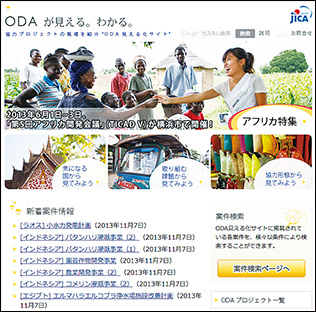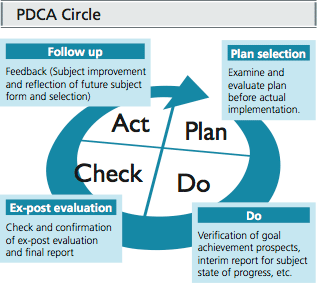Japan's Official Development Assistance White Paper 2013
(2) Effective Aid Implementation
●Website for visualization of ODA
The “ODA mieru-ka site” (website for visualization of ODA) was launched on the JICA website in April 2011 to enhance transparency to increase public understanding and support for ODA. Photographs, ex-ante/ex-post evaluations, and other information are being posted as needed to enrich information, in order to communicate to the people about the ODA projects around the world, in an easy-to-understand manner, such as an overview of each loan aid, grant aid that JICA is implementing, and technical cooperation projects, as well as the process from project formation to completion. Likewise, lists summarizing the specific achievement status of projects and lessons learned from projects implemented in the past, including those where an effect was achieved or where a sufficient effect was not produced, have already been publicized three times to promote more effective implementation of ODA.

ODA visualization site, the “ODA mieru-ka site” http://www.jica.go.jp/oda![]()
![]()
●PDCA Cycle
Regarding strengthening the PDCA cycle, efforts are proceeding in relation to (i) formulating Country Assistance Policies for all recipient countries of Japan’s ODA, (ii) establishing the Development Project Accountability Committee, and (iii) strengthening the evaluation framework. In particular, the Development Project Accountability Committee established in 2011 plays a central role in the PDCA cycle. Before surveys are implemented to formulate new projects of technical cooperation, grant aid, and loan aid, six external experts from NGOs, the business sector, academic societies and the press exchange candid views on the details of the surveys with MOFA and JICA departments so that past experiences and the perspectives of external experts are incorporated into new projects. These efforts are continuing to further improve the PDCA cycle.

●Enhancement of Evaluation
In order to implement ODA more effectively and efficiently, there is a need for its continuous improvement by reflecting accurate understanding of the implementing process and effects of development cooperation. To this end, MOFA, other related ministries, and JICA conduct monitoring and evaluation of ODA. ODA evaluations are positioned within the PDCA cycle. The lessons and recommendations gained from the evaluation results are conveyed to the relevant departments of MOFA and JICA, and the governments of recipient countries in order to utilize them in future planning and implementation processes. In addition, it is important to explain to the Japanese people how ODA is used and what effects have been achieved. Thus, MOFA publishes the results of ODA evaluations through websites in order to fulfill its accountability.
Currently, MOFA mainly implements evaluations at the policy-level (country assistance evaluations and priority issue evaluations) and evaluations at the program-level (aid modality evaluations and sector program evaluations). Policy and program-level evaluations implemented by MOFA are made in accordance with the DAC Criteria for Evaluating Development Assistance (Relevance, Effectiveness, Efficiency, Impact, and Sustainability), and assess whether relevant policies have been taken, whether the development effects have been increased by the development cooperation, and whether the processes of implementing development cooperation have been appropriate. To secure its objectivity and transparency, evaluations are conducted by third parties.
Since 2011, ODA evaluation had been conducted from diplomatic viewpoints in addition to development viewpoints.
Meanwhile, JICA implements evaluations on each technical cooperation, ODA loan, and grant aid project as well as on its theme. In addition to conducting consistent evaluations from the pre-implementation stage, the implementation stage, to the post implementation stage, JICA has established consistent evaluation mechanism of these three assistance modalities. These evaluations are conducted in accordance with the DAC Criteria for Evaluating Development Assistance, with projects that exceed a certain monetary amount being subject to ex-post evaluations by an external party.
Response measures to each recommendation and lesson obtained from these ODA evaluations are reflected in future policy formulation and implementation of ODA.
MOFA also conducts policy evaluations on economic cooperation policies in general, ex-ante evaluations on projects that exceed a certain amount of money, and ex-post evaluations on pending projects that have not proceeded for five years, and incomplete projects* that have not concluded after ten years. These are carried out pursuant to the Government Policy Evaluations Act (GPEA).
- *Pending projects/incomplete projects
- “Projects that have not begun after five years” are projects for which the loan agreement has not been signed or loan disbursement has not begun after five years have elapsed since the decision was made to implement the project. “Projects that have not been completed after ten years” are projects for which loan disbursements have not been completed after ten years have elapsed since the decision was made to implement the project.
●Preventing Fraudulent Practices
Given that Japan’s ODA is funded by taxpayers’ money, fraudulent use of funds provided through development cooperation must not be allowed under any circumstances. Accordingly, the government and JICA work to ensure the transparency of procurement procedures and other procedures.
At the procurement stage of ODA projects, tendering procedures are conducted by developing countries in accordance with the guidelines. After the verification of the results, to increase transparency JICA discloses information not only on the name of the contractee but also the contract amount. In case frauds are discovered relating to procurement or other stages of ODA project implementation, measures are to be taken to exclude companies engaged in fraud from bidding or receiving contracts for projects for a certain period.
Efforts are also being made for auditing. These efforts include expanding external auditing, implementing spot audits, and taking measures to improve auditing based on audit results. With regard to external audits, they are being implemented at JICA by accounting auditors. Regarding grant aid, external audits of Grant Assistance for Grass-roots Human Security Projects worth ¥3 million or more must be conducted by outside auditors, and are being steadily implemented.
As for loan aid, a mechanism has been introduced for audits that can be conducted where necessary for projects agreed upon by the governments. For technical cooperation, JICA conducts internal audits via sampling. JICA also conducts technical audits of grant aid.
Japan has ratified the OECD Convention on Combating Bribery of Foreign Public Officials in International Business Transactions, and is strict in its fair handling of fraudulent business with foreign government-related parties, including the application of the Unfair Competition Prevention Act, in order to ensure confidence in ODA projects.
Improprieties were discovered in ODA loan projects in Viet Nam and in 2008 persons concerned in a relevant Japanese company were prosecuted and convicted in Viet Nam. To prevent the recurrence of similar fraud, an exploratory committee was established under the supervision of the Minister for Foreign Affairs, composed of external specialists. The committee compiled its report in September 2009. Based on this report, MOFA and JICA reviewed their guidelines for measures against companies engaged in fraudulent practices, which stipulate that such companies may not participate in tenders for a certain period of time. In addition, a support system was established to support overseas arms of Japanese companies through embassies and overseas JICA offices, thereby urging related industries to comply with laws. Other initiatives include hosting seminars concerning international contract terms and conditions for Japanese companies, through the cooperation of industry associations, enhancing the involvement of JICA during the selection of consultants by partner countries, and holding discussions with other donor countries to prevent fraud and corruption. These efforts were compiled in February 2011. In FY 2012, Japan suspended participation in tenders vis-à-vis three projects (four companies) for a certain period of time.
